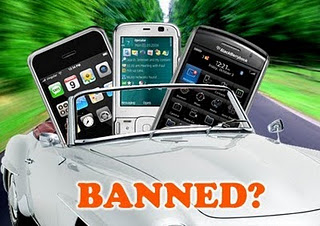The Psychology of Why Government SHOULD Limit Our Use of Cell Phones While We Drive

Most Americans know that talking on the cell phone while they’re driving is dangerous. And two thirds of Americans say they do it anyway. So it’s not surprising that people are not too happy that the National Transportation Safety Board (NTSB) has recommended that all cell phone use by drivers, texting or talking…even talking on a hands-free device…be banned (except for emergencies). Is this Big Brother government butting too far into our lives? Or does government have a legitimate right to act in the name of the greater common good to keep people from doing what may feel okay, but which puts themselves and others in danger.
The facts are easy. Driving While Phoning – DWP – mostly distracts your brain, and Driving While Texting or Driving While Emailing – DWT or DWE – does a really effective job at distracting your hands and your vision too, and turning you into a real menace behind the wheel. You have probably seen this for yourself; some driver yakking or texting, swerving around, speeding up and slowing down, threatening everybody around him. You may have even done this yourself, and realized how dangerously distracting DWP/DWT/DWE are, and continued to do it anyway.
The psychology of risk perception explains how we can behave so irrationality;
For all those reasons, public reaction to the sweeping ban proposed by the NTSB has mostly been negative. People opposing the ban say things like “I need the phone to be productive while I’m on the road”. That’s risk vs. benefit. Or “I’M a good driver. I can use the phone and drive and text, safely.” That’s Optimism Bias, and the fantasy of control. (And it really is a fantasy to think you won’t be distracted, no matter how good a driver you think you are. In simulators at the University of Utah, study subjects who are sure they can drive and talk safely crash and run red lights and stop signs and react more slowly to the same degree that mildly drunk drunk drivers do. Sorry, everyone out there who thinks this won’t happen to YOU. It will. You can’t help it.)
You also hear people wonder why the NTSB wants to even ban hands-free devices, which several state laws specifically permit. Sorry, states, the NTSB is right. Those laws don’t seem to work, and may even make things worse. Research by the Insurance Institute for Highway Safety finds that in states that go hands-free, insurance claims for accidents either stay the same or rise slightly. How might hands-free laws make things worse? It’s back to the psychology of risk perception. Cell phone conversations mostly distract your brain, not your hand, so hands-free is actually no safer. But it feels safer. You feel like you have more control! Less worried, you drive with less caution, even though you’re still just as mentally distracted.
But here’s the big question this issue raises. If we know some behavior is dangerous, and because of the way our perception of risk works we still want to do it, should the government be able to butt in and make us stop? Sorry libertarians and anti-government conservatives, but, you bet. At it’s very core, that’s what government is for…to protect us from the behaviors of others that we can’t protect ourselves from as individuals. Only the most fundamentalist libertarian could argue against basic public safety laws, and police, and society working together to do things in the name of the common good that we can’t do by ourselves. A ban may not be the best way to attack this problem, and the specifics of how this risk is managed should be the subject of lots of open and democratic debate. But that debate should be based on the bedrock premise of any society, that people who live together submit to basic rules they agree to share in the name of fairness, safety, and civil society.
I’m one of those millions who know DWP is dangerous, and occasionally do it anyway. I am slightly embarrassed to confess that I have had several near misses, and continue to lie to myself that “I’m a good driver. I can be careful and this safely.” I know about the risk perception psychology – Optimism Bias and a false sense of control – causing my own dangerous irrationality, and how the inherently subjective nature of risk perception is putting me, and the people around me, at risk, and contributing to thousands of deaths and tens of thousands of injuries. I know about this stuff and still behave this way! And that means I accept that sometimes we do need society…which after all is just you and me acting together in our common interest…to step in with laws and rules, or incentives and disincentives, that help protect us when our perceptions of a risk feel right, but produce behaviors that actually make things more dangerous.





